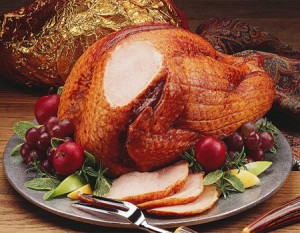
The Food Safety Information Council today released their food safety tips for Christmas and Summer entertaining especially warning about the risk of raw or minimally cooked foods.
Cathy Moir, Council Chair, said that we are all looking forward this Summer to getting together with multi-generations of family and friends which will include those most at risk if they get food poisoning: the elderly, pregnant, and people with poor immune systems.
‘With an estimated 4.67 million cases of food poisoning a year in Australia we all want to keep our family and friends safe, which we can do by following some simple tips.
‘Firstly, cook your meat and poultry to a safe temperature. Our recent consumer survey found that 4% surveyed said they had eaten rare meat or offal with 0.2% eating raw meat or offal in the last six months. This is a risk for food poisoning, including parasitic infections such as toxoplasmosis. You can protect your guests by using a digital meat thermometer and cook your foods safely to these temperatures measured in the centre of the food:
- All poultry including turkey (whole cuts, roast or mince) should be cooked to at least 75°C.
- Beef, lamb, kangaroo in whole cuts like chops, steaks, pieces and roasts at least 63°C (medium rare) and leave to rest 3 to 5 minutes.
- Pork whole cuts and pieces to 70°C and roasts to between 70°C and 75°C and leave to rest 3 to 5 minutes.
- Beef, lamb, kangaroo, or pork that have been made into sausages, hamburgers or mince as well as rolled roasts, liver and other offal 75°C
- Fish fillets should be cooked to around 63°C or when flesh flakes easily
‘Eggs and egg dishes such as quiche, can also be a food safety risk and should be cooked to 72°C in the centre (or until the white is firm and the yolk thickens). Raw eggs in eggnog and health shakes, raw egg mayonnaise and aioli, or fancy desserts made with raw eggs like tiramisu are a real risk for food poisoning.
‘Don’t forget to wash your hands with soap and water before preparing and cooking food, and after handling shell eggs, seafood, raw meat and poultry, burgers and sausages.
‘Here are some more key Christmas and Summer entertaining food safety tips which may also help reduce the cost of food and waste less:
- Don’t strain your fridge: Plan ahead and don’t buy more food than you need. It’s vital that you don’t overstock your fridge and freezer, as this won’t allow the cool air to circulate freely and food cannot be adequately frozen or chilled. Less food will also help to reduce food waste.
- Make space: Prevent overstocking by making room in your fridge for perishable foods by removing alcohol and soft drinks and put them on ice in a container or laundry sink. This also stops guests opening the fridge so often and helps to maintain the temperature at 5°C or below. Use a fridge thermometer to check the fridge temperature.
- Bird or bits? Think about getting a turkey breast that is simpler to cook, rather than a whole turkey. If you do need a whole turkey ask your supermarket if they sell them fresh rather than frozen. Otherwise it must be covered and defrosted in your fridge which can take several days and also increases the risk of potentially contaminating ready to eat foods stored in the fridge.
- Christmas ham won’t last forever – check the storage instructions and best before or use by date before removing the ham from its plastic wrap. Cover it with a clean cloth soaked in water and vinegar, keep the cloth moist so it doesn’t dry out, and store it in the fridge at or below 5°C. It is important to remember that the use by date on the original packaging won’t apply after the packaging has been removed, so check the fine print on the label for the suggested shelf life after opening (or ask your butcher if it us unpackaged). Reduced salt hams are now becoming popular but will not last as long as conventional hams so think how much you are going to use in the next week or so and freeze the rest for later.
- Phased roll-out: Don’t leave perishable chilled foods out in the heat of Summer for more than an hour. These foods include cold meats, soft cheeses like Camembert and Brie, cold poultry, cooked seafood like prawns and smoked salmon, pâtés, sushi and salads. Put out small amounts and replace them (do not top them up) from the fridge.
- Get it cold, quick. Refrigerate leftovers as soon as possible. If perishable foods and leftovers have been left out of the fridge for less than two hours they should be okay to refrigerate or freeze to eat later, so long as they haven’t been sitting out on a hot day. Never eat perishable food that has been unrefrigerated for more than four hours as it may not be safe and should be thrown away. Food should not be refrigerated if it has been outside in the heat for more than an hour and discarded after it has been outside for more than 2 hours.
‘We would like to thank our partner Tonic Media Network who will be showing our handwashing and food safety community service announcements in GP, Pharmacy and hospital waiting rooms around Australia this Summer. Also, thanks to our members Accord and the Australian Chicken Meat Federation for their charitable donations to fund our Summer campaign and SA Health for their funding of our consumer research,’ Ms Moir concluded.
Media contacts: Lydia Buchtmann, Communication Director, 0407 626 688 or info@foodsafety.asn.au
Cathy Moir, Chair, 0412 291 460

